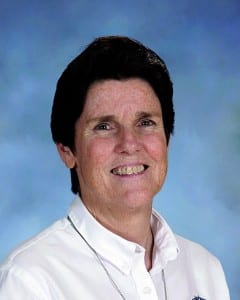
Epiphany Catholic School (ECS), 5557 SW 84 St., continues to blossom says Sister Margaret Fagan, who has served nine years as principal while teaching preschool through eighth grade students.
Although the increasing wave of society’s technology can pose challenges to the education system, Fagan said ECS works hard to keep its teaching style balanced. Fagan said the school is excited to have implemented its new interactive curriculum.
“For our sixth through eighth grades, the books are interactive. Our students have the opportunity not only to learn and practice during school time, but can also access their books online when they are home,” Fagan said. “The program includes tutorials for the students, so they can return home and listen to lessons taught in class 100 times over if they wish to.”
Fagan believes that the interactive program also is beneficial in that it allows the students to feel more independent and responsible.
“I have also seen the students grow. They feel more mature, not only because they are learning in school, but also because they have the responsibility at home, repeating lessons on their own time,” Fagan said.
In the past, the preschool program at ECS included a part-day curriculum, one for 3- year-olds and one for 4-year-olds. Recently, the 3-year-old program was eliminated and the 4-year-old program, “preschool-4,” incorporated a full-day schedule. Fagan believes this allows the 4-year-olds to be “full members of the school,” and allows the students to engage more in the classroom technology that the school has to offer.
“The ‘preschool-4’ program allows every classroom to have an interactive, touchscreen ‘smart board.’ The students are able to see the world around them, brainstorming with the class, writing their own stories, and developing skills that a few years ago we weren’t able to touch when it was only a part-time program,” Fagan said.
Although the growth of technology provides schools with innovative teaching tools, Fagan understands that its use comes with difficulties. “With technology, it is a challenge to try and impress upon the students that when they put something out on the social media, the world sees it and it’s permanent,” Fagan said.
“With the social media, I have noticed that there is a lack of awareness of Internet permanency; it can be a danger.”
ECS hopes to combat the cons of technology use by instilling important spiritual characteristics in students. In addition to the already implemented peacemaker and anti-bullying programs, the school introduced a leadership elective for its seventh and eighth grade students this year.
“Through the elective, students work with our counselor in role-playing. By presenting different scenarios to the younger grades, they are able to act out how people should treat one another,” Fagan said. “It has been a learning tool not only for the students actually enrolled in the leadership elective, but also for the younger students that the skits were presented to.”
For the future, Fagan said the school will implement a critical-thinking teaching method, the “Common Course Standards” program.
“The emphasis next year will be more intense on critical thinking — not just memorization, but application. We’ve started with this critical thinking implementation in student electives such as robotics, inspiring students to bring together creativity, math skills, and critical thinking,” Fagan said.
Despite the inevitable challenges that all educators face, Fagan asserts that the desire to grow and progress is what has made ECS a great place to learn.
“We’re not perfect, but we always try to make sure that today is better than yesterday and that tomorrow is better than today,” Fagan said. “Our school has a very supportive community.”






